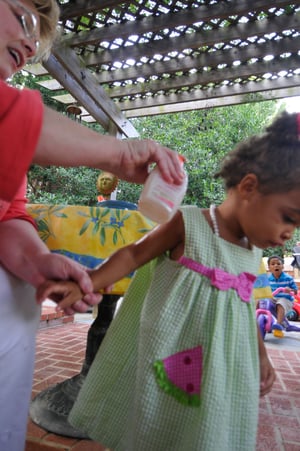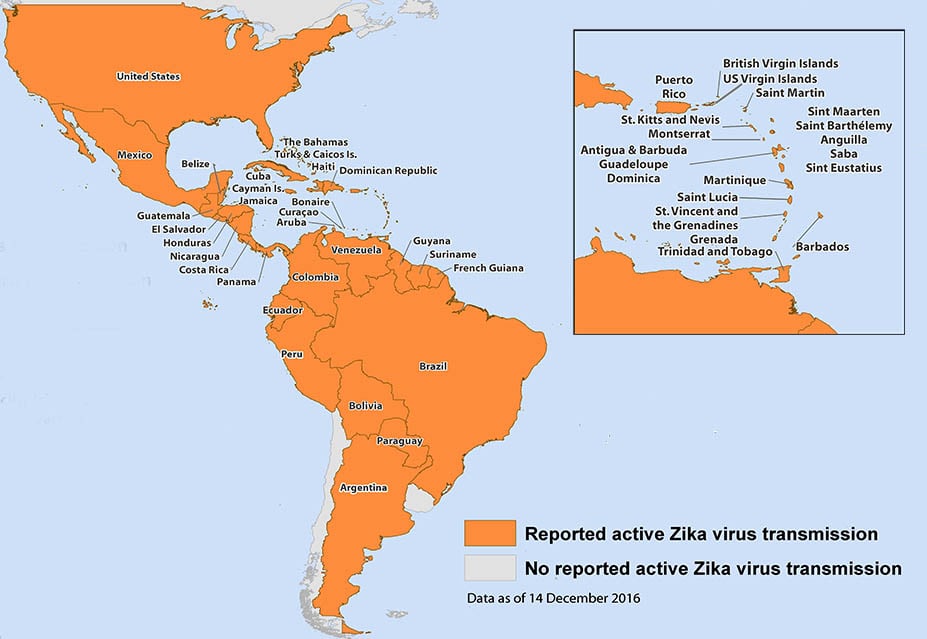
It’s a funny sounding name, but this virus is no joke.
The Zika virus is growing health concern that has the attention of lead health agencies, including the Centers for Disease Control and Prevention (CDC) and the World Health Organization (WHO).The Zika virus can be spread in three different ways. The most common way is when a mosquito bites someone who has Zika and then bites someone else, thus spreading the virus. Another way of spreading Zika is through unprotected sexual activity. A third route of transmission can happen when a pregnant woman gets Zika, she can pass it to her fetus. A fourth way is through a blood transfusion, however this has not occurred in the United States. The CDC has developed an infographic explaining how Zika is spread.
Zika can cause symptoms such as fever, rash, joint pain, and red eyes. However, only 1 in 5 of those infected with Zika will show symptoms. There is no drug to treat the virus and no approved vaccine to prevent Zika.
Zika Webinar Recording
On June 22, 2016, Child Care of Aware® of America's Emergency Preparedness Team conducted a webinar with experts from the U.S. Centers for Disease Control and Prevention (CDC), Children’s Health Team, and Pregnancy and Birth Defects Task Force. The webinar covered various topics, including:
- The basics of the Zika virus (how its spread, signs and symptoms, risk factors)
- The role of child care providers in prevention (mosquito control and repellent guidelines)
- Recommendations for pregnant mothers and parents considering pregnancy
You can view the webinar below.
Child Care of Aware® of America has additional information about mosquitoes and the use of repellents in “Fight the Bite of Mosquitoes this Summer."
About Zika
Zika is suspected of causing microcephaly in newborns, which literally means ‘small head’ or the under-development of the infant’s head and brain which can cause developmental delays, seizures, and other concerns. The virus can spread from the mother to the unborn baby.
Mother-to-Baby
Pregnant women or families who would like to speak to someone about a possible Zika virus infection or diagnosis during pregnancy and potential risks to the baby can contact MotherToBaby, a service of the nonprofit Organization of Teratology Information Specialists (OTIS). MotherToBaby is not affiliated with CDC.
MotherToBaby experts are available during business hours to answer questions in English or Spanish by phone or talk about Zika:
- Call 1-866-626-6847
- Chat live or send an email through http://mothertobaby.org/
The CDC has issued travel advisories for a many countries in the Caribbean, Central America, South America, the Pacific Islands and Mexico. You can view the latest travel alerts by visiting the CDC's Zika Travel Notice Website. Health officials are encouraging pregnant women and women planning to become pregnant to postpone travel to these locations.
Map: Countries and Territories Reporting Active Mosquito Transmission of Zika. Source: CDC
Preventing and Controlling Mosquitoes
For prevention, individuals living in mosquito-prone areas are encouraged to use insect repellent and cover-up with long sleeves and pants.
Remove sources of standing water - such as buckets, rain barrels, old tires, bird baths, potted plants without drainage, flowerpot saucers, areas of the lawn with poor drainage.
Keep windows and doors shut. If you must open windows, be sure they have screens.
Avoid dark, wet/damp areas - this is where mosquitoes rest. Some examples include: garages, basements, under patio furniture, lower-level entrances, areas with heavy plant growth/shade, under the sink or in cabinets, or in closets.
Follow these tips from CDC to build your own Zika Prevention Kit.
CDC has released Zika Virus Response Planning: Interim Guidance for District and School Administrators in the Continental United States and Hawaii, an interim guidance document outlining actions pertaining to Zika virus infection for kindergarten through grade 12 (K–12) district and school administrators.
What does all of this mean for child care programs?
Prevention is key! Special attention and help should be given to those who may not be able to protect themselves adequately, such as young children.
- Educate yourself, staff, and parents on steps to take steps to reduce the risk of mosquito bites.
- Mosquitoes that spread Zika bite mostly during the daytime. Consider limiting outdoor activities.
- When outside, children should dress in clothing that covers their arms and legs.
- Engage children in mosquito prevention. Mosquito Bites Are Bad is an interactive activity and coloring book designed to educate children on preventing mosquito bites.
- Sesame Street has also launched a new toolkit: Preventing Zika
- While insect repellent can be an effective means of prevention, learn safe ways to apply repellent, avoid use for children under 2 months old, and seek parental permission prior to using on a child. Child Care of Aware® of America has additional information about mosquitoes and the use of repellents in “Fight the Bite of Mosquitoes this Summer“.
- Pregnant individuals, or those who plan to become pregnant, should follow the guidelines set by the CDC if they have a trip to a Zika impacted location planned. Consult with your physician prior to traveling out of the country. More information at: http://www.cdc.gov/zika/pregnancy/index.html
Learn more about Zika from the CDC: http://www.cdc.gov/zika/
Frequently Asked Questions - Zika
Q. How is Zika spread?
A. The Zika virus can be spread in three different ways. The most common way is when a mosquito bites someone who has Zika and then bites someone else, thus spreading the virus. Another way of spreading Zika is through unprotected sexual activity the virus can be passed through sexual contact and can live in a man's semen. A third route of transmission can happen when a pregnant woman gets Zika, she can pass it to her fetus.
Q. Where is Zika?
A. As of August 2016, the majority of Zika caess in the United States have all been in individuals who have traveled to Zika-prone areas. However, in late July 2016, CDC and Florida health officials identified an area north of downtown Miami, where local transmission of Zika is suspected. Zika is currently in Central America, South America and the Caribbean. For a complete list of the latest information visit the CDC's Travel Information Page
Q. I am pregnant, where can I learn more?
A. Visit the CDC's Zika Page for Pregnant Women
Q. Can Zika be spread through breast milk?
A. There are no known cases of Zika being transmitted through breast milk. The benefits of breast feeding outweigh any risk that Zika may be spread through breast milk. Learn more from the World Health Organization's document, Infant feeding in areas of Zika virus transmission.
Q. What are the signs/symptoms of Zika?
A. The signs/symptoms of Zika are common to other summer-time illnesses: such as fever, rash, joint pain, and red eyes. However, only 1 in 5 of those infected with Zika will show symptoms. Travel history is the most important factor to consider when attempting to determine if someone has Zika.
Q. What types of mosquito repellent can I use on children?
A. Child Care of Aware® of America has additional information about mosquitoes and the use of repellents in “Fight the Bite of Mosquitoes this Summer“.
Q. How can I teach children about Zika?
A. Mosquito Bites Are Bad is an interactive activity and coloring book designed by CDC to educate children on preventing mosquito bites. Sesame Street has also launched a new toolkit: Preventing Zika
Q. Where can I learn more information?
A. You can learn more about Zika from the CDC: http://www.cdc.gov/zika/
Q. I have a question about Zika, who can I contact?
A. Email our Preparedness Team at preparedness@usa.childcareaware.org
Editor's Note: Content Updated: February, 1, 2017, January 10, 2017, December, 6, 2016, October 1, 2016, August 22, 2016, August 3, 2016, June 23, 2016, May 16, 2016, original post January 29, 2016.







